Critical Analysis: Leadership Theories for the Millennial Workforce
VerifiedAdded on 2023/06/14
|12
|2912
|461
Essay
AI Summary
This essay critically analyzes the applicability of traditional leadership theories to the millennial workforce. It examines transformational leadership, leader-member exchange, information processing, authentic leadership, and ethical leadership, highlighting their limitations in motivating and engaging millennial employees. The analysis points out the differences in values and work ethics between generations, emphasizing the need for leaders to adapt their approaches. The essay also suggests aligning personal and organizational goals, improving communication, and integrating ethical practices to effectively manage the millennial workforce. Desklib provides a platform for students to access similar essays and a wide range of study resources.
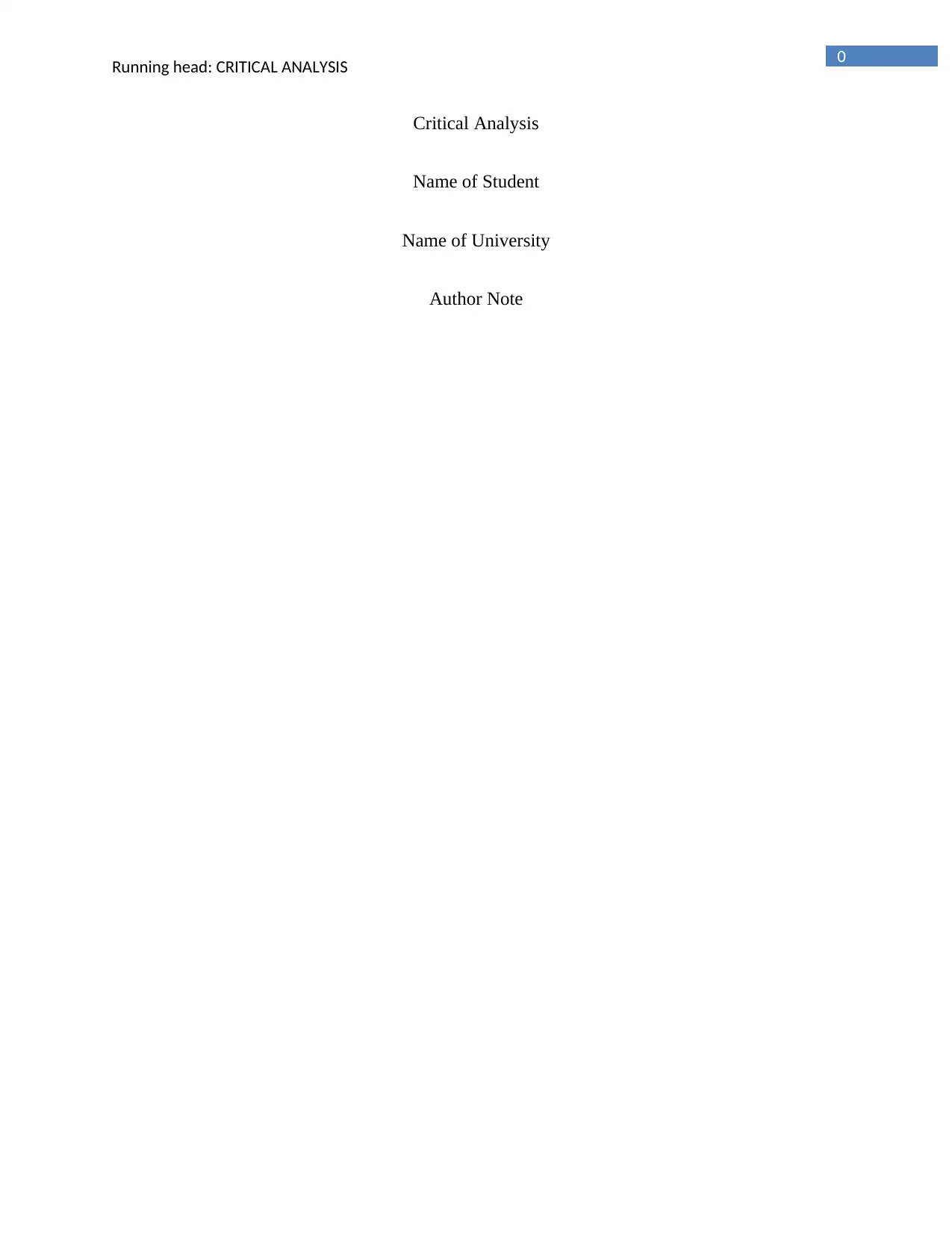
0
Running head: CRITICAL ANALYSIS
Critical Analysis
Name of Student
Name of University
Author Note
Running head: CRITICAL ANALYSIS
Critical Analysis
Name of Student
Name of University
Author Note
Paraphrase This Document
Need a fresh take? Get an instant paraphrase of this document with our AI Paraphraser
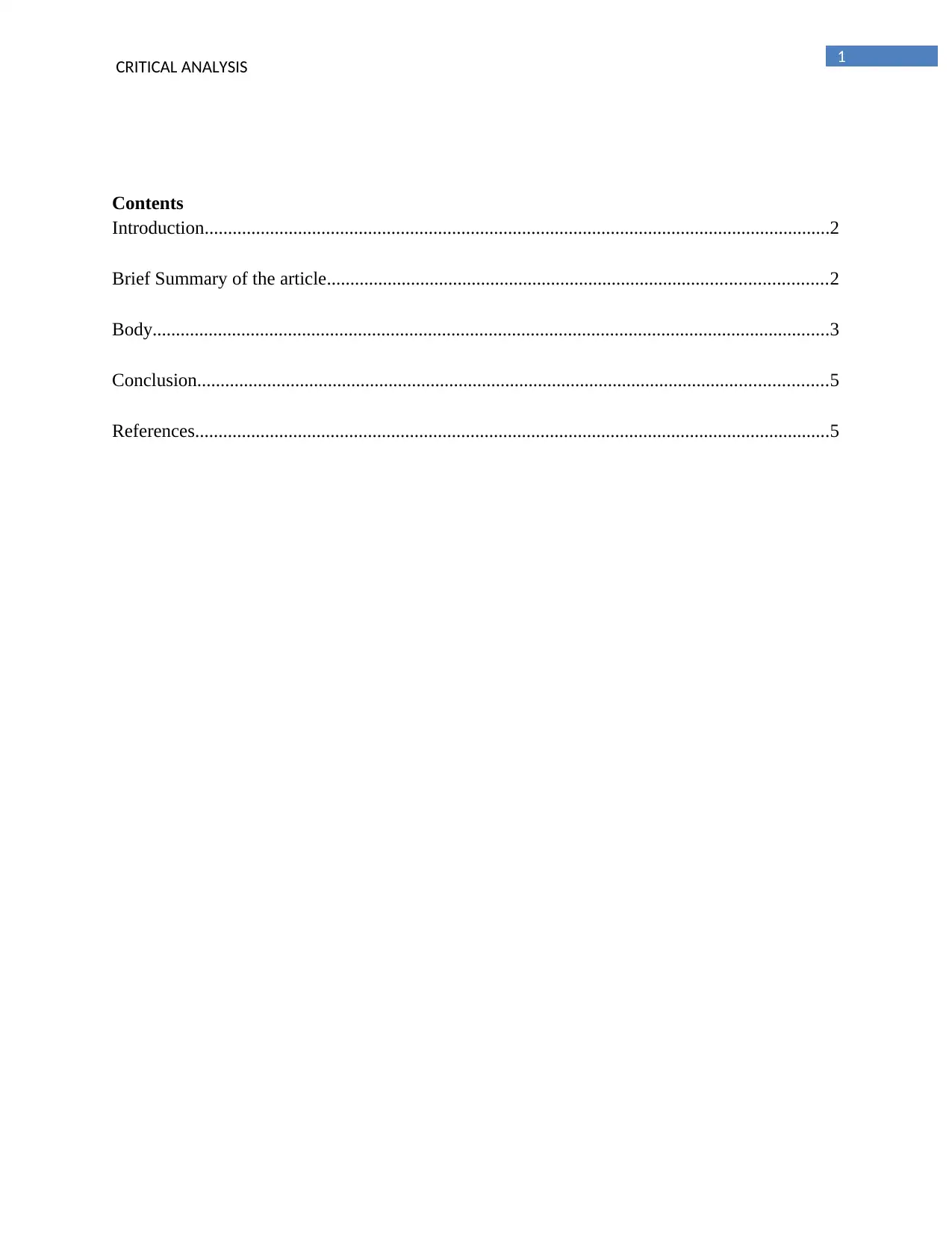
1
CRITICAL ANALYSIS
Contents
Introduction......................................................................................................................................2
Brief Summary of the article...........................................................................................................2
Body.................................................................................................................................................3
Conclusion.......................................................................................................................................5
References........................................................................................................................................5
CRITICAL ANALYSIS
Contents
Introduction......................................................................................................................................2
Brief Summary of the article...........................................................................................................2
Body.................................................................................................................................................3
Conclusion.......................................................................................................................................5
References........................................................................................................................................5
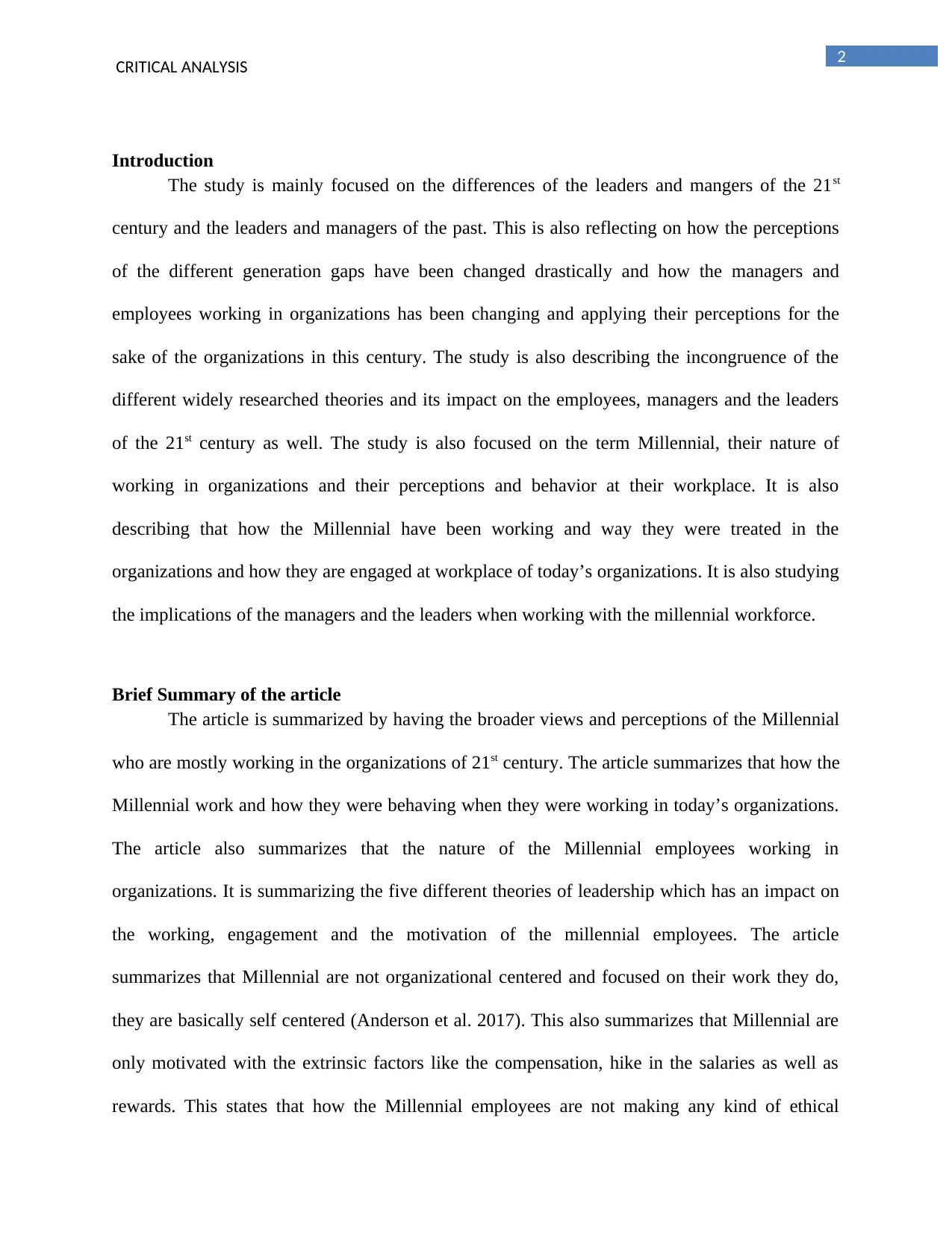
2
CRITICAL ANALYSIS
Introduction
The study is mainly focused on the differences of the leaders and mangers of the 21st
century and the leaders and managers of the past. This is also reflecting on how the perceptions
of the different generation gaps have been changed drastically and how the managers and
employees working in organizations has been changing and applying their perceptions for the
sake of the organizations in this century. The study is also describing the incongruence of the
different widely researched theories and its impact on the employees, managers and the leaders
of the 21st century as well. The study is also focused on the term Millennial, their nature of
working in organizations and their perceptions and behavior at their workplace. It is also
describing that how the Millennial have been working and way they were treated in the
organizations and how they are engaged at workplace of today’s organizations. It is also studying
the implications of the managers and the leaders when working with the millennial workforce.
Brief Summary of the article
The article is summarized by having the broader views and perceptions of the Millennial
who are mostly working in the organizations of 21st century. The article summarizes that how the
Millennial work and how they were behaving when they were working in today’s organizations.
The article also summarizes that the nature of the Millennial employees working in
organizations. It is summarizing the five different theories of leadership which has an impact on
the working, engagement and the motivation of the millennial employees. The article
summarizes that Millennial are not organizational centered and focused on their work they do,
they are basically self centered (Anderson et al. 2017). This also summarizes that Millennial are
only motivated with the extrinsic factors like the compensation, hike in the salaries as well as
rewards. This states that how the Millennial employees are not making any kind of ethical
CRITICAL ANALYSIS
Introduction
The study is mainly focused on the differences of the leaders and mangers of the 21st
century and the leaders and managers of the past. This is also reflecting on how the perceptions
of the different generation gaps have been changed drastically and how the managers and
employees working in organizations has been changing and applying their perceptions for the
sake of the organizations in this century. The study is also describing the incongruence of the
different widely researched theories and its impact on the employees, managers and the leaders
of the 21st century as well. The study is also focused on the term Millennial, their nature of
working in organizations and their perceptions and behavior at their workplace. It is also
describing that how the Millennial have been working and way they were treated in the
organizations and how they are engaged at workplace of today’s organizations. It is also studying
the implications of the managers and the leaders when working with the millennial workforce.
Brief Summary of the article
The article is summarized by having the broader views and perceptions of the Millennial
who are mostly working in the organizations of 21st century. The article summarizes that how the
Millennial work and how they were behaving when they were working in today’s organizations.
The article also summarizes that the nature of the Millennial employees working in
organizations. It is summarizing the five different theories of leadership which has an impact on
the working, engagement and the motivation of the millennial employees. The article
summarizes that Millennial are not organizational centered and focused on their work they do,
they are basically self centered (Anderson et al. 2017). This also summarizes that Millennial are
only motivated with the extrinsic factors like the compensation, hike in the salaries as well as
rewards. This states that how the Millennial employees are not making any kind of ethical
⊘ This is a preview!⊘
Do you want full access?
Subscribe today to unlock all pages.

Trusted by 1+ million students worldwide
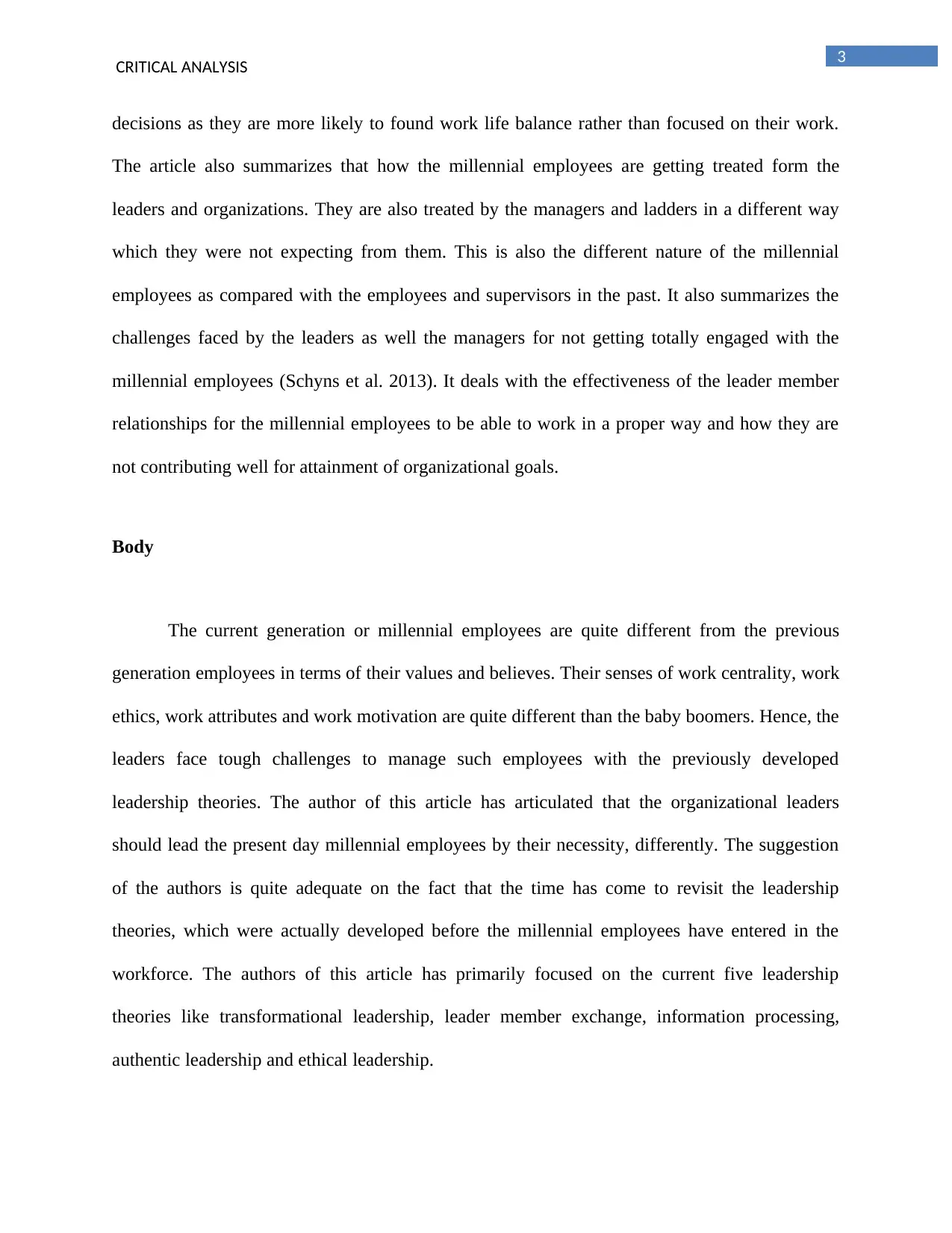
3
CRITICAL ANALYSIS
decisions as they are more likely to found work life balance rather than focused on their work.
The article also summarizes that how the millennial employees are getting treated form the
leaders and organizations. They are also treated by the managers and ladders in a different way
which they were not expecting from them. This is also the different nature of the millennial
employees as compared with the employees and supervisors in the past. It also summarizes the
challenges faced by the leaders as well the managers for not getting totally engaged with the
millennial employees (Schyns et al. 2013). It deals with the effectiveness of the leader member
relationships for the millennial employees to be able to work in a proper way and how they are
not contributing well for attainment of organizational goals.
Body
The current generation or millennial employees are quite different from the previous
generation employees in terms of their values and believes. Their senses of work centrality, work
ethics, work attributes and work motivation are quite different than the baby boomers. Hence, the
leaders face tough challenges to manage such employees with the previously developed
leadership theories. The author of this article has articulated that the organizational leaders
should lead the present day millennial employees by their necessity, differently. The suggestion
of the authors is quite adequate on the fact that the time has come to revisit the leadership
theories, which were actually developed before the millennial employees have entered in the
workforce. The authors of this article has primarily focused on the current five leadership
theories like transformational leadership, leader member exchange, information processing,
authentic leadership and ethical leadership.
CRITICAL ANALYSIS
decisions as they are more likely to found work life balance rather than focused on their work.
The article also summarizes that how the millennial employees are getting treated form the
leaders and organizations. They are also treated by the managers and ladders in a different way
which they were not expecting from them. This is also the different nature of the millennial
employees as compared with the employees and supervisors in the past. It also summarizes the
challenges faced by the leaders as well the managers for not getting totally engaged with the
millennial employees (Schyns et al. 2013). It deals with the effectiveness of the leader member
relationships for the millennial employees to be able to work in a proper way and how they are
not contributing well for attainment of organizational goals.
Body
The current generation or millennial employees are quite different from the previous
generation employees in terms of their values and believes. Their senses of work centrality, work
ethics, work attributes and work motivation are quite different than the baby boomers. Hence, the
leaders face tough challenges to manage such employees with the previously developed
leadership theories. The author of this article has articulated that the organizational leaders
should lead the present day millennial employees by their necessity, differently. The suggestion
of the authors is quite adequate on the fact that the time has come to revisit the leadership
theories, which were actually developed before the millennial employees have entered in the
workforce. The authors of this article has primarily focused on the current five leadership
theories like transformational leadership, leader member exchange, information processing,
authentic leadership and ethical leadership.
Paraphrase This Document
Need a fresh take? Get an instant paraphrase of this document with our AI Paraphraser
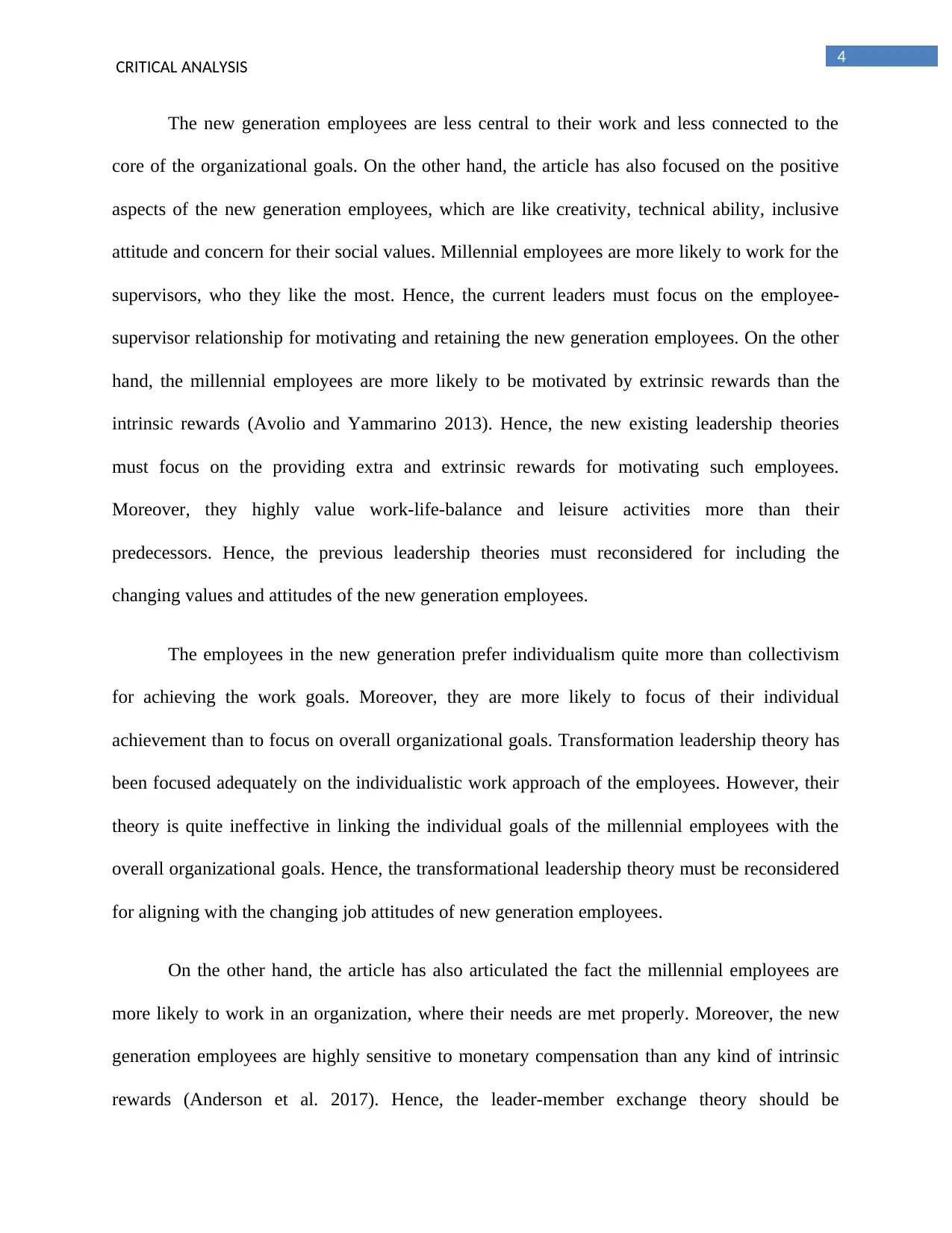
4
CRITICAL ANALYSIS
The new generation employees are less central to their work and less connected to the
core of the organizational goals. On the other hand, the article has also focused on the positive
aspects of the new generation employees, which are like creativity, technical ability, inclusive
attitude and concern for their social values. Millennial employees are more likely to work for the
supervisors, who they like the most. Hence, the current leaders must focus on the employee-
supervisor relationship for motivating and retaining the new generation employees. On the other
hand, the millennial employees are more likely to be motivated by extrinsic rewards than the
intrinsic rewards (Avolio and Yammarino 2013). Hence, the new existing leadership theories
must focus on the providing extra and extrinsic rewards for motivating such employees.
Moreover, they highly value work-life-balance and leisure activities more than their
predecessors. Hence, the previous leadership theories must reconsidered for including the
changing values and attitudes of the new generation employees.
The employees in the new generation prefer individualism quite more than collectivism
for achieving the work goals. Moreover, they are more likely to focus of their individual
achievement than to focus on overall organizational goals. Transformation leadership theory has
been focused adequately on the individualistic work approach of the employees. However, their
theory is quite ineffective in linking the individual goals of the millennial employees with the
overall organizational goals. Hence, the transformational leadership theory must be reconsidered
for aligning with the changing job attitudes of new generation employees.
On the other hand, the article has also articulated the fact the millennial employees are
more likely to work in an organization, where their needs are met properly. Moreover, the new
generation employees are highly sensitive to monetary compensation than any kind of intrinsic
rewards (Anderson et al. 2017). Hence, the leader-member exchange theory should be
CRITICAL ANALYSIS
The new generation employees are less central to their work and less connected to the
core of the organizational goals. On the other hand, the article has also focused on the positive
aspects of the new generation employees, which are like creativity, technical ability, inclusive
attitude and concern for their social values. Millennial employees are more likely to work for the
supervisors, who they like the most. Hence, the current leaders must focus on the employee-
supervisor relationship for motivating and retaining the new generation employees. On the other
hand, the millennial employees are more likely to be motivated by extrinsic rewards than the
intrinsic rewards (Avolio and Yammarino 2013). Hence, the new existing leadership theories
must focus on the providing extra and extrinsic rewards for motivating such employees.
Moreover, they highly value work-life-balance and leisure activities more than their
predecessors. Hence, the previous leadership theories must reconsidered for including the
changing values and attitudes of the new generation employees.
The employees in the new generation prefer individualism quite more than collectivism
for achieving the work goals. Moreover, they are more likely to focus of their individual
achievement than to focus on overall organizational goals. Transformation leadership theory has
been focused adequately on the individualistic work approach of the employees. However, their
theory is quite ineffective in linking the individual goals of the millennial employees with the
overall organizational goals. Hence, the transformational leadership theory must be reconsidered
for aligning with the changing job attitudes of new generation employees.
On the other hand, the article has also articulated the fact the millennial employees are
more likely to work in an organization, where their needs are met properly. Moreover, the new
generation employees are highly sensitive to monetary compensation than any kind of intrinsic
rewards (Anderson et al. 2017). Hence, the leader-member exchange theory should be
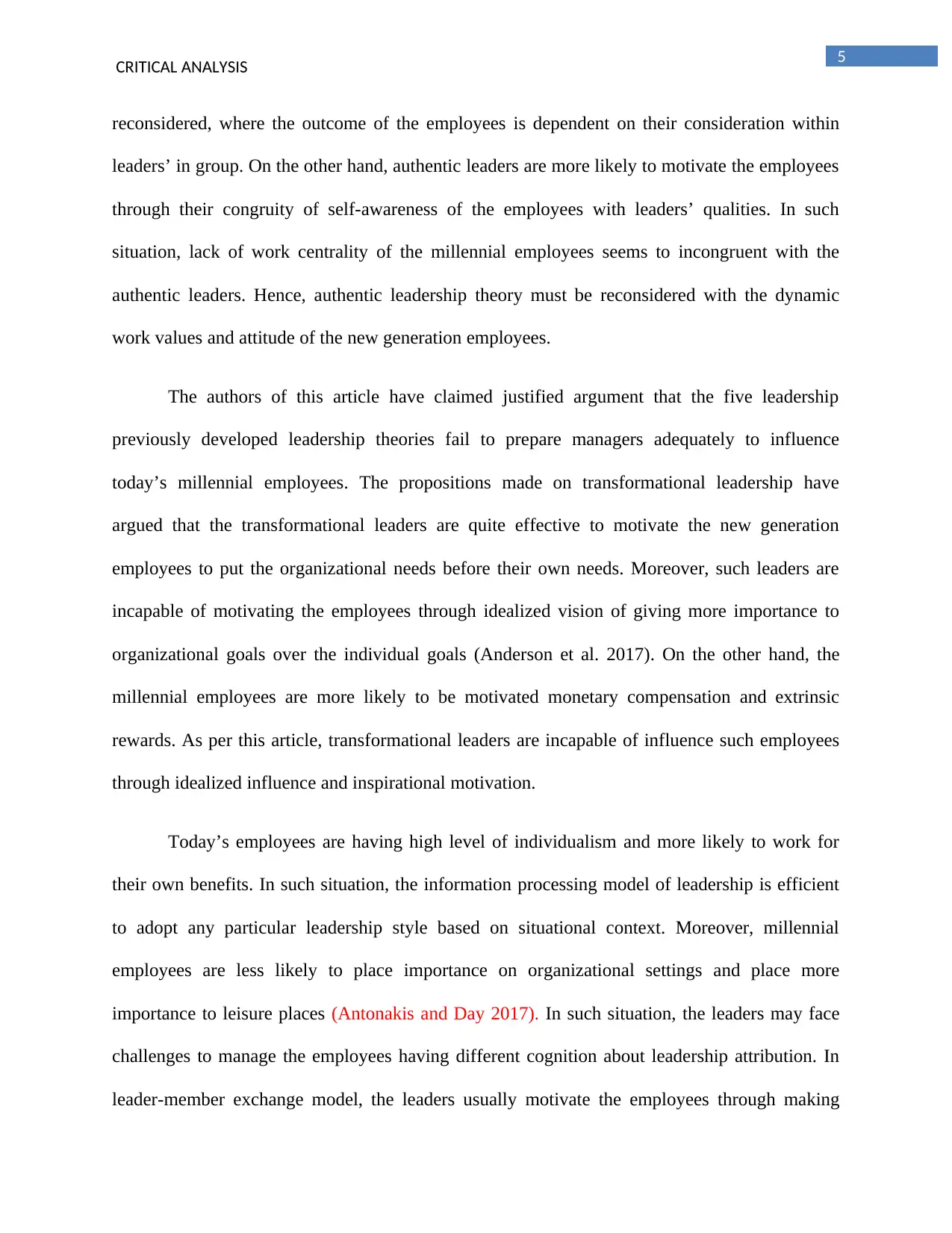
5
CRITICAL ANALYSIS
reconsidered, where the outcome of the employees is dependent on their consideration within
leaders’ in group. On the other hand, authentic leaders are more likely to motivate the employees
through their congruity of self-awareness of the employees with leaders’ qualities. In such
situation, lack of work centrality of the millennial employees seems to incongruent with the
authentic leaders. Hence, authentic leadership theory must be reconsidered with the dynamic
work values and attitude of the new generation employees.
The authors of this article have claimed justified argument that the five leadership
previously developed leadership theories fail to prepare managers adequately to influence
today’s millennial employees. The propositions made on transformational leadership have
argued that the transformational leaders are quite effective to motivate the new generation
employees to put the organizational needs before their own needs. Moreover, such leaders are
incapable of motivating the employees through idealized vision of giving more importance to
organizational goals over the individual goals (Anderson et al. 2017). On the other hand, the
millennial employees are more likely to be motivated monetary compensation and extrinsic
rewards. As per this article, transformational leaders are incapable of influence such employees
through idealized influence and inspirational motivation.
Today’s employees are having high level of individualism and more likely to work for
their own benefits. In such situation, the information processing model of leadership is efficient
to adopt any particular leadership style based on situational context. Moreover, millennial
employees are less likely to place importance on organizational settings and place more
importance to leisure places (Antonakis and Day 2017). In such situation, the leaders may face
challenges to manage the employees having different cognition about leadership attribution. In
leader-member exchange model, the leaders usually motivate the employees through making
CRITICAL ANALYSIS
reconsidered, where the outcome of the employees is dependent on their consideration within
leaders’ in group. On the other hand, authentic leaders are more likely to motivate the employees
through their congruity of self-awareness of the employees with leaders’ qualities. In such
situation, lack of work centrality of the millennial employees seems to incongruent with the
authentic leaders. Hence, authentic leadership theory must be reconsidered with the dynamic
work values and attitude of the new generation employees.
The authors of this article have claimed justified argument that the five leadership
previously developed leadership theories fail to prepare managers adequately to influence
today’s millennial employees. The propositions made on transformational leadership have
argued that the transformational leaders are quite effective to motivate the new generation
employees to put the organizational needs before their own needs. Moreover, such leaders are
incapable of motivating the employees through idealized vision of giving more importance to
organizational goals over the individual goals (Anderson et al. 2017). On the other hand, the
millennial employees are more likely to be motivated monetary compensation and extrinsic
rewards. As per this article, transformational leaders are incapable of influence such employees
through idealized influence and inspirational motivation.
Today’s employees are having high level of individualism and more likely to work for
their own benefits. In such situation, the information processing model of leadership is efficient
to adopt any particular leadership style based on situational context. Moreover, millennial
employees are less likely to place importance on organizational settings and place more
importance to leisure places (Antonakis and Day 2017). In such situation, the leaders may face
challenges to manage the employees having different cognition about leadership attribution. In
leader-member exchange model, the leaders usually motivate the employees through making
⊘ This is a preview!⊘
Do you want full access?
Subscribe today to unlock all pages.

Trusted by 1+ million students worldwide
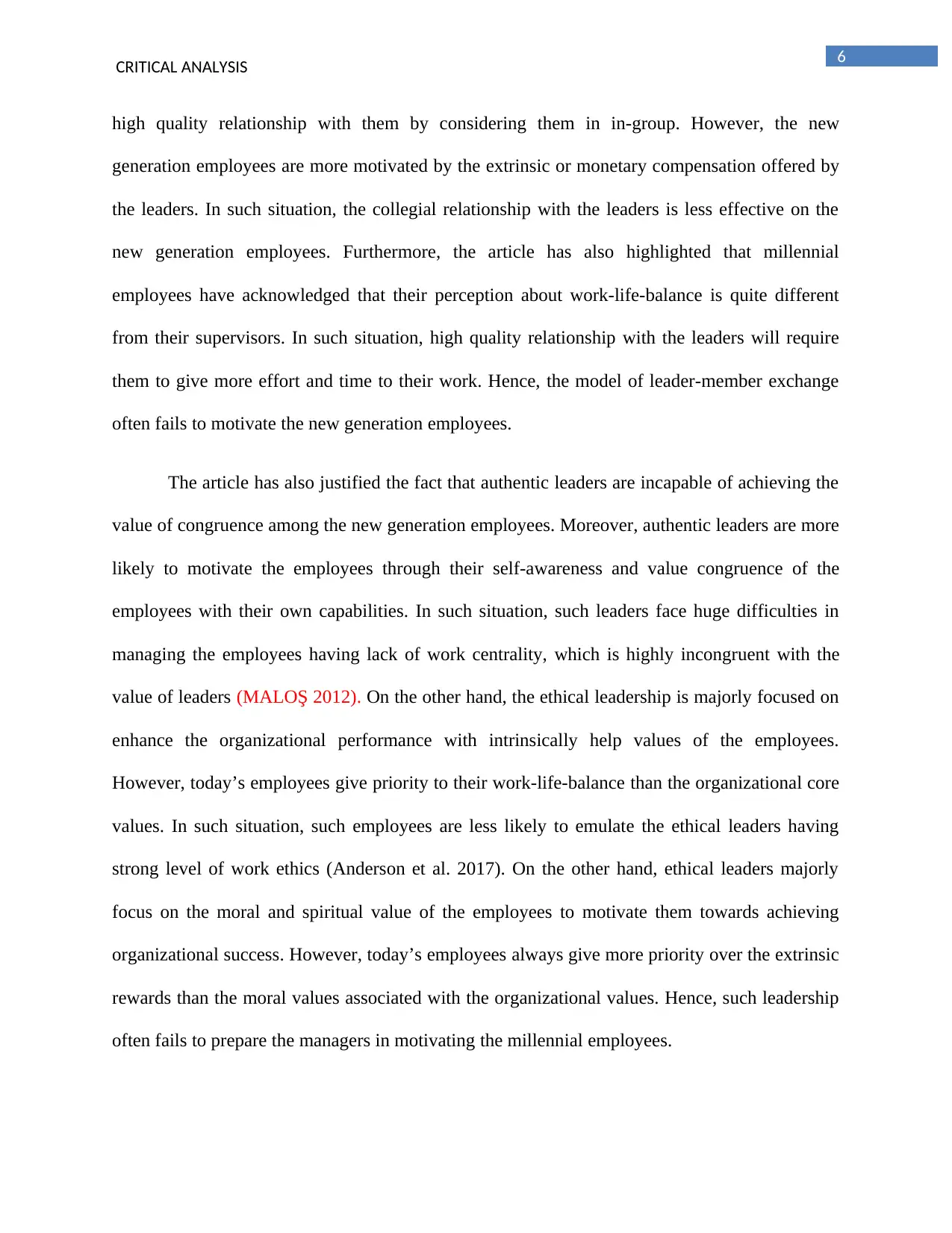
6
CRITICAL ANALYSIS
high quality relationship with them by considering them in in-group. However, the new
generation employees are more motivated by the extrinsic or monetary compensation offered by
the leaders. In such situation, the collegial relationship with the leaders is less effective on the
new generation employees. Furthermore, the article has also highlighted that millennial
employees have acknowledged that their perception about work-life-balance is quite different
from their supervisors. In such situation, high quality relationship with the leaders will require
them to give more effort and time to their work. Hence, the model of leader-member exchange
often fails to motivate the new generation employees.
The article has also justified the fact that authentic leaders are incapable of achieving the
value of congruence among the new generation employees. Moreover, authentic leaders are more
likely to motivate the employees through their self-awareness and value congruence of the
employees with their own capabilities. In such situation, such leaders face huge difficulties in
managing the employees having lack of work centrality, which is highly incongruent with the
value of leaders (MALOŞ 2012). On the other hand, the ethical leadership is majorly focused on
enhance the organizational performance with intrinsically help values of the employees.
However, today’s employees give priority to their work-life-balance than the organizational core
values. In such situation, such employees are less likely to emulate the ethical leaders having
strong level of work ethics (Anderson et al. 2017). On the other hand, ethical leaders majorly
focus on the moral and spiritual value of the employees to motivate them towards achieving
organizational success. However, today’s employees always give more priority over the extrinsic
rewards than the moral values associated with the organizational values. Hence, such leadership
often fails to prepare the managers in motivating the millennial employees.
CRITICAL ANALYSIS
high quality relationship with them by considering them in in-group. However, the new
generation employees are more motivated by the extrinsic or monetary compensation offered by
the leaders. In such situation, the collegial relationship with the leaders is less effective on the
new generation employees. Furthermore, the article has also highlighted that millennial
employees have acknowledged that their perception about work-life-balance is quite different
from their supervisors. In such situation, high quality relationship with the leaders will require
them to give more effort and time to their work. Hence, the model of leader-member exchange
often fails to motivate the new generation employees.
The article has also justified the fact that authentic leaders are incapable of achieving the
value of congruence among the new generation employees. Moreover, authentic leaders are more
likely to motivate the employees through their self-awareness and value congruence of the
employees with their own capabilities. In such situation, such leaders face huge difficulties in
managing the employees having lack of work centrality, which is highly incongruent with the
value of leaders (MALOŞ 2012). On the other hand, the ethical leadership is majorly focused on
enhance the organizational performance with intrinsically help values of the employees.
However, today’s employees give priority to their work-life-balance than the organizational core
values. In such situation, such employees are less likely to emulate the ethical leaders having
strong level of work ethics (Anderson et al. 2017). On the other hand, ethical leaders majorly
focus on the moral and spiritual value of the employees to motivate them towards achieving
organizational success. However, today’s employees always give more priority over the extrinsic
rewards than the moral values associated with the organizational values. Hence, such leadership
often fails to prepare the managers in motivating the millennial employees.
Paraphrase This Document
Need a fresh take? Get an instant paraphrase of this document with our AI Paraphraser
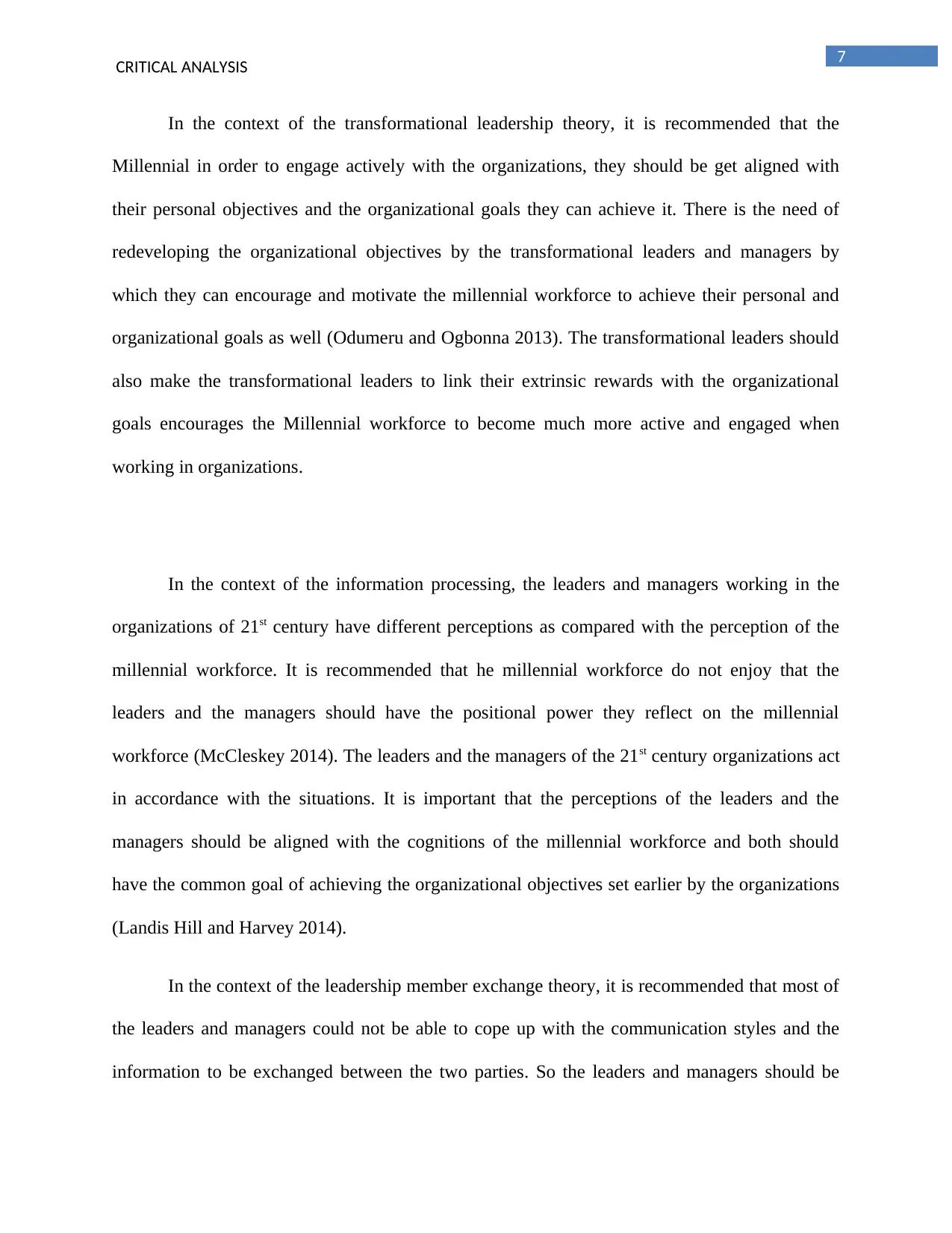
7
CRITICAL ANALYSIS
In the context of the transformational leadership theory, it is recommended that the
Millennial in order to engage actively with the organizations, they should be get aligned with
their personal objectives and the organizational goals they can achieve it. There is the need of
redeveloping the organizational objectives by the transformational leaders and managers by
which they can encourage and motivate the millennial workforce to achieve their personal and
organizational goals as well (Odumeru and Ogbonna 2013). The transformational leaders should
also make the transformational leaders to link their extrinsic rewards with the organizational
goals encourages the Millennial workforce to become much more active and engaged when
working in organizations.
In the context of the information processing, the leaders and managers working in the
organizations of 21st century have different perceptions as compared with the perception of the
millennial workforce. It is recommended that he millennial workforce do not enjoy that the
leaders and the managers should have the positional power they reflect on the millennial
workforce (McCleskey 2014). The leaders and the managers of the 21st century organizations act
in accordance with the situations. It is important that the perceptions of the leaders and the
managers should be aligned with the cognitions of the millennial workforce and both should
have the common goal of achieving the organizational objectives set earlier by the organizations
(Landis Hill and Harvey 2014).
In the context of the leadership member exchange theory, it is recommended that most of
the leaders and managers could not be able to cope up with the communication styles and the
information to be exchanged between the two parties. So the leaders and managers should be
CRITICAL ANALYSIS
In the context of the transformational leadership theory, it is recommended that the
Millennial in order to engage actively with the organizations, they should be get aligned with
their personal objectives and the organizational goals they can achieve it. There is the need of
redeveloping the organizational objectives by the transformational leaders and managers by
which they can encourage and motivate the millennial workforce to achieve their personal and
organizational goals as well (Odumeru and Ogbonna 2013). The transformational leaders should
also make the transformational leaders to link their extrinsic rewards with the organizational
goals encourages the Millennial workforce to become much more active and engaged when
working in organizations.
In the context of the information processing, the leaders and managers working in the
organizations of 21st century have different perceptions as compared with the perception of the
millennial workforce. It is recommended that he millennial workforce do not enjoy that the
leaders and the managers should have the positional power they reflect on the millennial
workforce (McCleskey 2014). The leaders and the managers of the 21st century organizations act
in accordance with the situations. It is important that the perceptions of the leaders and the
managers should be aligned with the cognitions of the millennial workforce and both should
have the common goal of achieving the organizational objectives set earlier by the organizations
(Landis Hill and Harvey 2014).
In the context of the leadership member exchange theory, it is recommended that most of
the leaders and managers could not be able to cope up with the communication styles and the
information to be exchanged between the two parties. So the leaders and managers should be
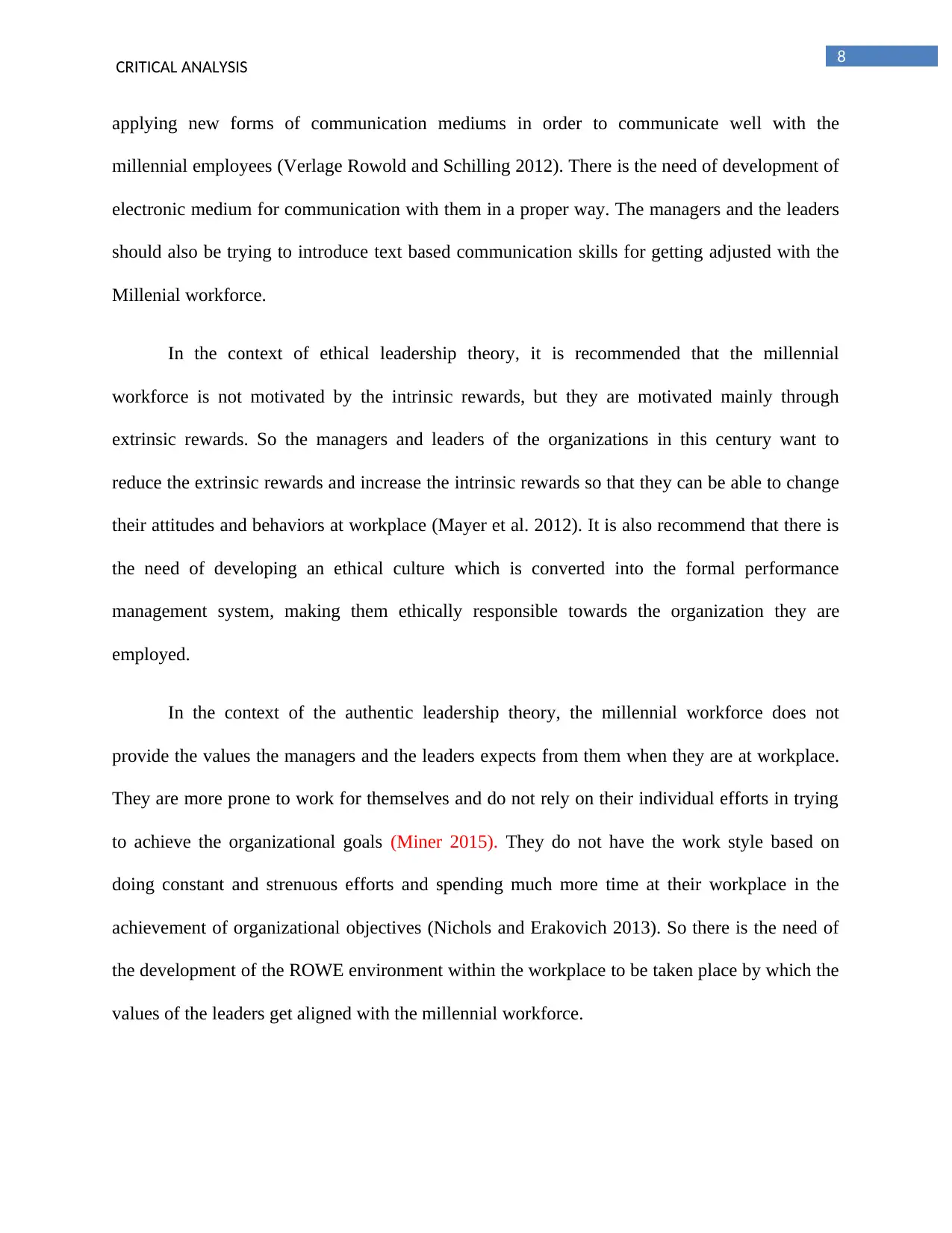
8
CRITICAL ANALYSIS
applying new forms of communication mediums in order to communicate well with the
millennial employees (Verlage Rowold and Schilling 2012). There is the need of development of
electronic medium for communication with them in a proper way. The managers and the leaders
should also be trying to introduce text based communication skills for getting adjusted with the
Millenial workforce.
In the context of ethical leadership theory, it is recommended that the millennial
workforce is not motivated by the intrinsic rewards, but they are motivated mainly through
extrinsic rewards. So the managers and leaders of the organizations in this century want to
reduce the extrinsic rewards and increase the intrinsic rewards so that they can be able to change
their attitudes and behaviors at workplace (Mayer et al. 2012). It is also recommend that there is
the need of developing an ethical culture which is converted into the formal performance
management system, making them ethically responsible towards the organization they are
employed.
In the context of the authentic leadership theory, the millennial workforce does not
provide the values the managers and the leaders expects from them when they are at workplace.
They are more prone to work for themselves and do not rely on their individual efforts in trying
to achieve the organizational goals (Miner 2015). They do not have the work style based on
doing constant and strenuous efforts and spending much more time at their workplace in the
achievement of organizational objectives (Nichols and Erakovich 2013). So there is the need of
the development of the ROWE environment within the workplace to be taken place by which the
values of the leaders get aligned with the millennial workforce.
CRITICAL ANALYSIS
applying new forms of communication mediums in order to communicate well with the
millennial employees (Verlage Rowold and Schilling 2012). There is the need of development of
electronic medium for communication with them in a proper way. The managers and the leaders
should also be trying to introduce text based communication skills for getting adjusted with the
Millenial workforce.
In the context of ethical leadership theory, it is recommended that the millennial
workforce is not motivated by the intrinsic rewards, but they are motivated mainly through
extrinsic rewards. So the managers and leaders of the organizations in this century want to
reduce the extrinsic rewards and increase the intrinsic rewards so that they can be able to change
their attitudes and behaviors at workplace (Mayer et al. 2012). It is also recommend that there is
the need of developing an ethical culture which is converted into the formal performance
management system, making them ethically responsible towards the organization they are
employed.
In the context of the authentic leadership theory, the millennial workforce does not
provide the values the managers and the leaders expects from them when they are at workplace.
They are more prone to work for themselves and do not rely on their individual efforts in trying
to achieve the organizational goals (Miner 2015). They do not have the work style based on
doing constant and strenuous efforts and spending much more time at their workplace in the
achievement of organizational objectives (Nichols and Erakovich 2013). So there is the need of
the development of the ROWE environment within the workplace to be taken place by which the
values of the leaders get aligned with the millennial workforce.
⊘ This is a preview!⊘
Do you want full access?
Subscribe today to unlock all pages.

Trusted by 1+ million students worldwide
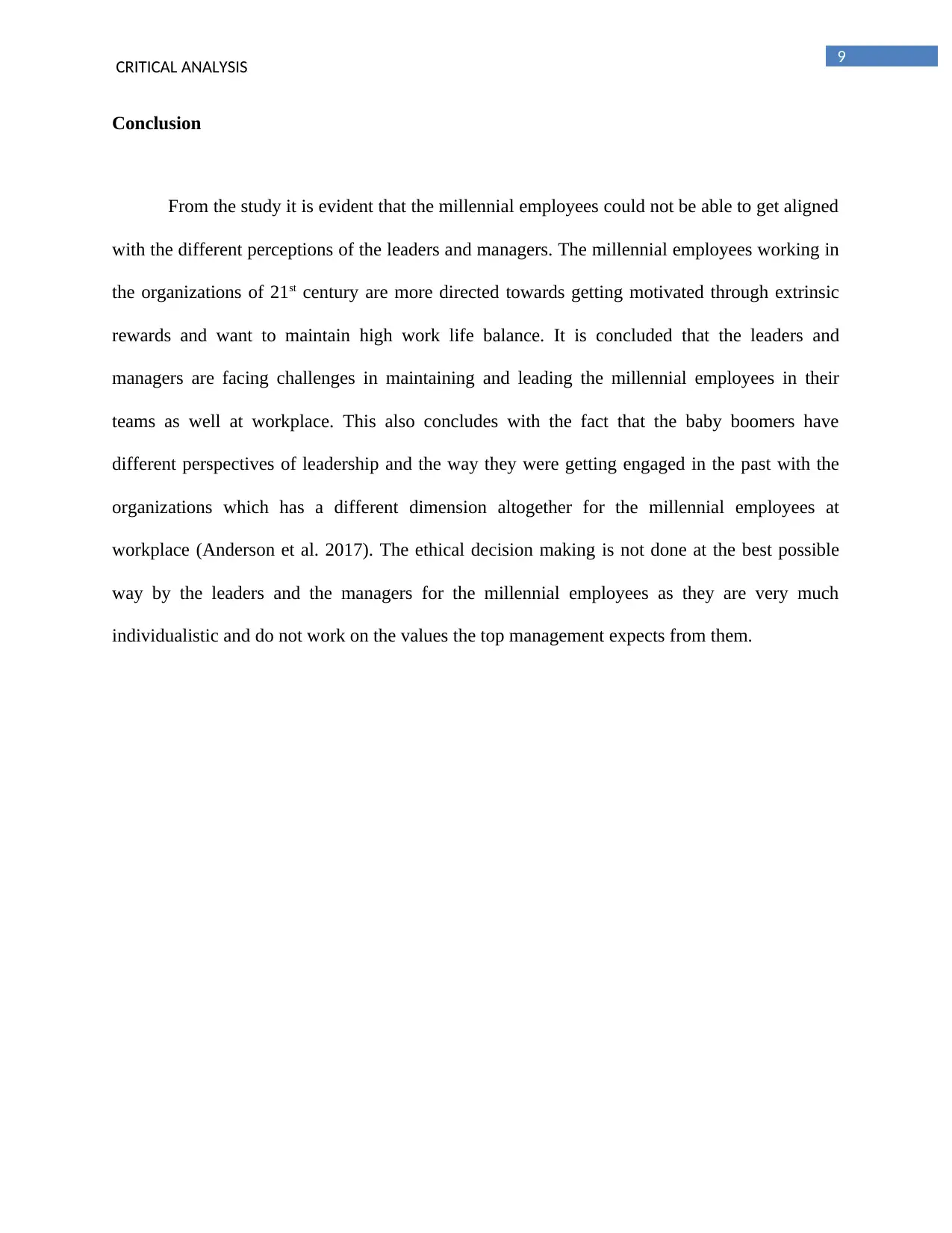
9
CRITICAL ANALYSIS
Conclusion
From the study it is evident that the millennial employees could not be able to get aligned
with the different perceptions of the leaders and managers. The millennial employees working in
the organizations of 21st century are more directed towards getting motivated through extrinsic
rewards and want to maintain high work life balance. It is concluded that the leaders and
managers are facing challenges in maintaining and leading the millennial employees in their
teams as well at workplace. This also concludes with the fact that the baby boomers have
different perspectives of leadership and the way they were getting engaged in the past with the
organizations which has a different dimension altogether for the millennial employees at
workplace (Anderson et al. 2017). The ethical decision making is not done at the best possible
way by the leaders and the managers for the millennial employees as they are very much
individualistic and do not work on the values the top management expects from them.
CRITICAL ANALYSIS
Conclusion
From the study it is evident that the millennial employees could not be able to get aligned
with the different perceptions of the leaders and managers. The millennial employees working in
the organizations of 21st century are more directed towards getting motivated through extrinsic
rewards and want to maintain high work life balance. It is concluded that the leaders and
managers are facing challenges in maintaining and leading the millennial employees in their
teams as well at workplace. This also concludes with the fact that the baby boomers have
different perspectives of leadership and the way they were getting engaged in the past with the
organizations which has a different dimension altogether for the millennial employees at
workplace (Anderson et al. 2017). The ethical decision making is not done at the best possible
way by the leaders and the managers for the millennial employees as they are very much
individualistic and do not work on the values the top management expects from them.
Paraphrase This Document
Need a fresh take? Get an instant paraphrase of this document with our AI Paraphraser
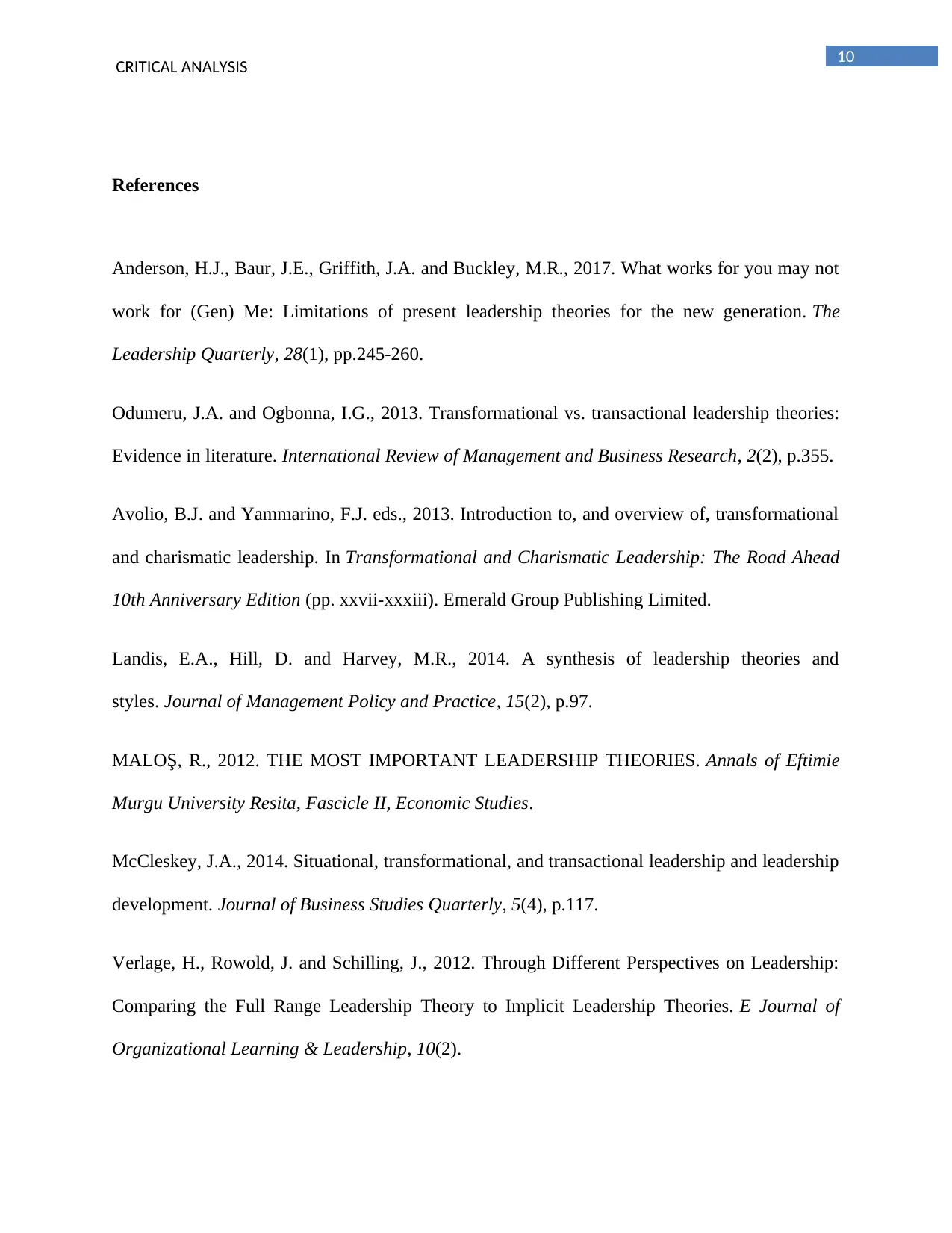
10
CRITICAL ANALYSIS
References
Anderson, H.J., Baur, J.E., Griffith, J.A. and Buckley, M.R., 2017. What works for you may not
work for (Gen) Me: Limitations of present leadership theories for the new generation. The
Leadership Quarterly, 28(1), pp.245-260.
Odumeru, J.A. and Ogbonna, I.G., 2013. Transformational vs. transactional leadership theories:
Evidence in literature. International Review of Management and Business Research, 2(2), p.355.
Avolio, B.J. and Yammarino, F.J. eds., 2013. Introduction to, and overview of, transformational
and charismatic leadership. In Transformational and Charismatic Leadership: The Road Ahead
10th Anniversary Edition (pp. xxvii-xxxiii). Emerald Group Publishing Limited.
Landis, E.A., Hill, D. and Harvey, M.R., 2014. A synthesis of leadership theories and
styles. Journal of Management Policy and Practice, 15(2), p.97.
MALOŞ, R., 2012. THE MOST IMPORTANT LEADERSHIP THEORIES. Annals of Eftimie
Murgu University Resita, Fascicle II, Economic Studies.
McCleskey, J.A., 2014. Situational, transformational, and transactional leadership and leadership
development. Journal of Business Studies Quarterly, 5(4), p.117.
Verlage, H., Rowold, J. and Schilling, J., 2012. Through Different Perspectives on Leadership:
Comparing the Full Range Leadership Theory to Implicit Leadership Theories. E Journal of
Organizational Learning & Leadership, 10(2).
CRITICAL ANALYSIS
References
Anderson, H.J., Baur, J.E., Griffith, J.A. and Buckley, M.R., 2017. What works for you may not
work for (Gen) Me: Limitations of present leadership theories for the new generation. The
Leadership Quarterly, 28(1), pp.245-260.
Odumeru, J.A. and Ogbonna, I.G., 2013. Transformational vs. transactional leadership theories:
Evidence in literature. International Review of Management and Business Research, 2(2), p.355.
Avolio, B.J. and Yammarino, F.J. eds., 2013. Introduction to, and overview of, transformational
and charismatic leadership. In Transformational and Charismatic Leadership: The Road Ahead
10th Anniversary Edition (pp. xxvii-xxxiii). Emerald Group Publishing Limited.
Landis, E.A., Hill, D. and Harvey, M.R., 2014. A synthesis of leadership theories and
styles. Journal of Management Policy and Practice, 15(2), p.97.
MALOŞ, R., 2012. THE MOST IMPORTANT LEADERSHIP THEORIES. Annals of Eftimie
Murgu University Resita, Fascicle II, Economic Studies.
McCleskey, J.A., 2014. Situational, transformational, and transactional leadership and leadership
development. Journal of Business Studies Quarterly, 5(4), p.117.
Verlage, H., Rowold, J. and Schilling, J., 2012. Through Different Perspectives on Leadership:
Comparing the Full Range Leadership Theory to Implicit Leadership Theories. E Journal of
Organizational Learning & Leadership, 10(2).
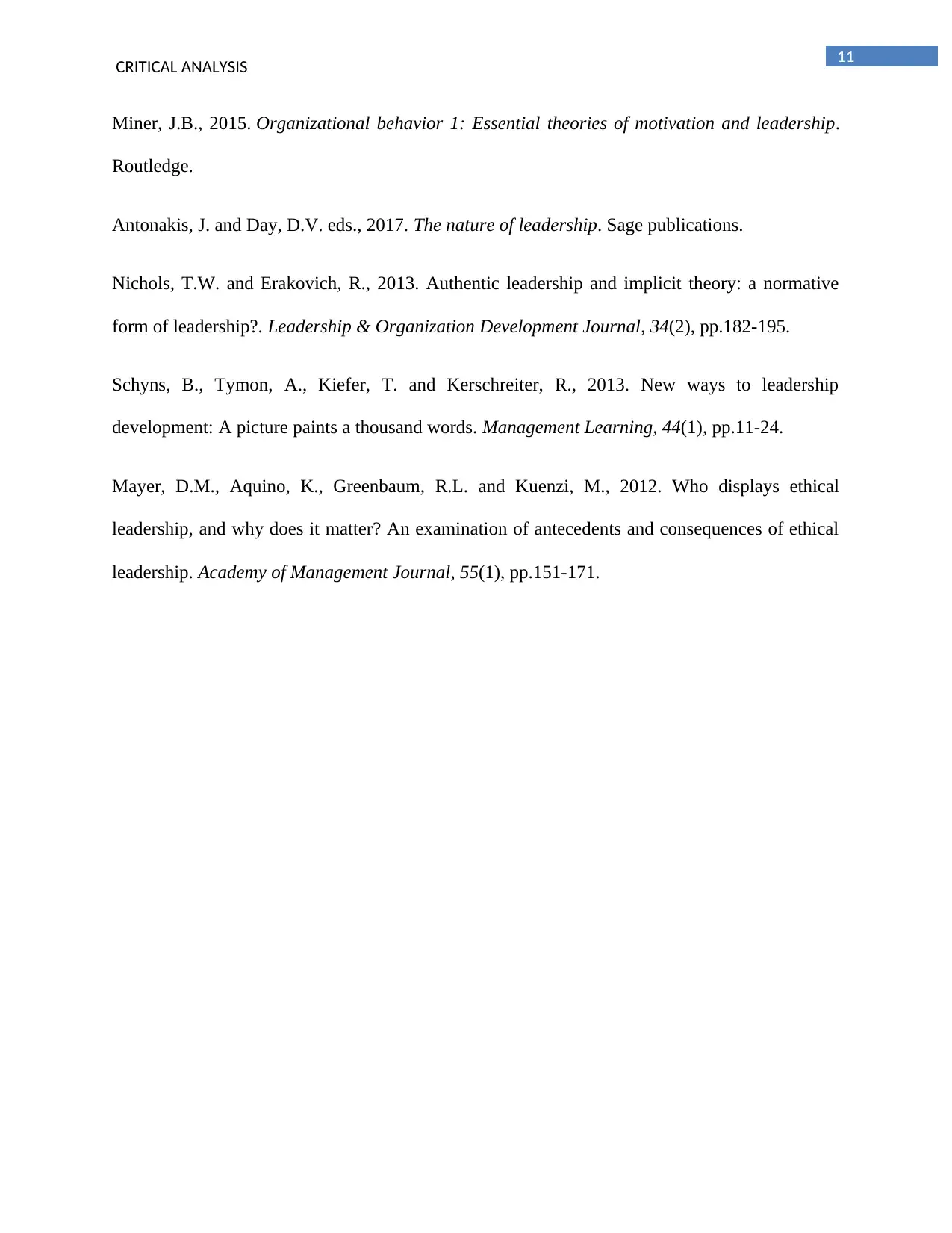
11
CRITICAL ANALYSIS
Miner, J.B., 2015. Organizational behavior 1: Essential theories of motivation and leadership.
Routledge.
Antonakis, J. and Day, D.V. eds., 2017. The nature of leadership. Sage publications.
Nichols, T.W. and Erakovich, R., 2013. Authentic leadership and implicit theory: a normative
form of leadership?. Leadership & Organization Development Journal, 34(2), pp.182-195.
Schyns, B., Tymon, A., Kiefer, T. and Kerschreiter, R., 2013. New ways to leadership
development: A picture paints a thousand words. Management Learning, 44(1), pp.11-24.
Mayer, D.M., Aquino, K., Greenbaum, R.L. and Kuenzi, M., 2012. Who displays ethical
leadership, and why does it matter? An examination of antecedents and consequences of ethical
leadership. Academy of Management Journal, 55(1), pp.151-171.
CRITICAL ANALYSIS
Miner, J.B., 2015. Organizational behavior 1: Essential theories of motivation and leadership.
Routledge.
Antonakis, J. and Day, D.V. eds., 2017. The nature of leadership. Sage publications.
Nichols, T.W. and Erakovich, R., 2013. Authentic leadership and implicit theory: a normative
form of leadership?. Leadership & Organization Development Journal, 34(2), pp.182-195.
Schyns, B., Tymon, A., Kiefer, T. and Kerschreiter, R., 2013. New ways to leadership
development: A picture paints a thousand words. Management Learning, 44(1), pp.11-24.
Mayer, D.M., Aquino, K., Greenbaum, R.L. and Kuenzi, M., 2012. Who displays ethical
leadership, and why does it matter? An examination of antecedents and consequences of ethical
leadership. Academy of Management Journal, 55(1), pp.151-171.
⊘ This is a preview!⊘
Do you want full access?
Subscribe today to unlock all pages.

Trusted by 1+ million students worldwide
1 out of 12
Related Documents
Your All-in-One AI-Powered Toolkit for Academic Success.
+13062052269
info@desklib.com
Available 24*7 on WhatsApp / Email
![[object Object]](/_next/static/media/star-bottom.7253800d.svg)
Unlock your academic potential
Copyright © 2020–2026 A2Z Services. All Rights Reserved. Developed and managed by ZUCOL.




